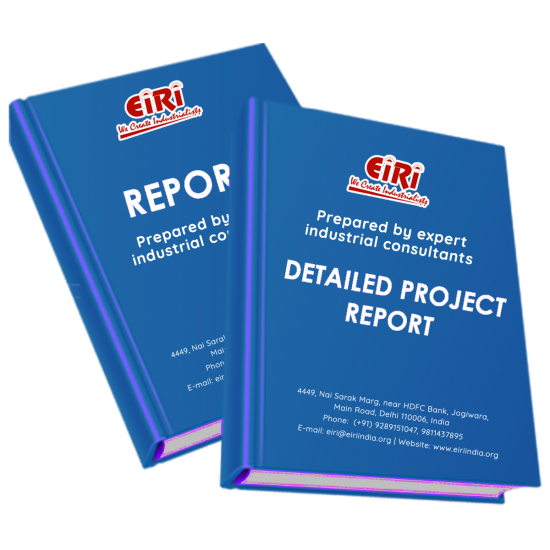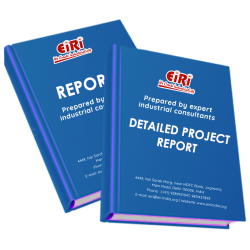Detailed Project Report on Cutting Oil

- More than 40 years of experience
- Managed by expert industrial consultants
- ISO 9001-2015 Certified
- Registered under MSME, UAM No: DL01E0012000
- 24/5 Research Support
Get your quesries resolved from an industry expert. Ask your queries before report or book purchase. - Custom Research Service
Speak to the our consultant to design an exclusive study to serve your research needs. - Quality Assurance
All reports are prepared by highly qualified consultants & verified by a panel of experts. - Information Security
Your personal & confidential information is safe & secure.
CUTTING OIL
[EIRI/EDPR/4357] J.C.: 2543XL
INTRODUCTION
Cutting Oils are important among metal working lubricants not only because of their requirement in large volume but also due to important technical considerations in their development, production and usage. The sophistication and automation of machine tools is considerably influenced by the availability of right type of cutting oils.
Metal working lubricants are important and in fact, necessary production aids to engineering industry and petroleum lubricating oils have established themselves as major constituents of such lubricants. Easy availability in wide range of viscosities and quality, as well as relatively consistent price, unaffected by vagaries of nature, has been their mainstay. The petroleum lubricating oils, lack in so many properties but lend themselves easily for supplementing with chemicals and additives to suit diversely different applications encountered in working of metals.
Cutting lubricants or cooling liquids as they are sometimes called are compounded oils or emulsions which are used wherever the cutting of metal is carried on. Cutting oils are important among metal working lubricants not only owing to their requirement in large volume but also due to important technical considerations in their development, production and usage. The sophistication and automation of machine tools is considerably influenced by the availability of right type of cutting oils.
The major function of cutting oil is to cool the cutting tool as well as lubricating the face of the tool and the chip, and preventing the chip from welding to cutting edge. In addition, cutting oils also provide a flushing action for chip removal, leave no stain or discoloration on the work, leave minimum sediment deposit on the machine, prevent or inhibit rusting of the machine and the work, resist bacterial growth, etc.
Metal working lubricants are broadly classified in the following categories:
Metal Forming and Deforming Lubricants
These types are used in operations like bar, wire, tube drawing, pressing, forging, rolling etc.
Cutting Oils
These are used in operations like turning, milling, gear cutting, drilling, grinding, broaching etc.
Heat Treatment Oils
These types are used for metal quenching and tempering.
The efficient use of cutting oil in cutting operations can result in better finish and precision of worked piece, longer tool life, higher cutting speeds lower power consumption, and easy starting of cutting operation. The main function of cutting oils is dissipation of heat and lubrication. Besides, they have important side functions. They help in removal of chip and swarf. By the combination of these functions and chemical activity, when necessary, they prevent welding of chip and tool.
There are many facts to effective & efficient metal cutting. Any change which will improve one of these areas, improves the total operation.
Cutting Oils
A wide variety of cutting oil are available in the market varying in composition and form, starting from simple solutions of soap in water to complicated well balanced formulations containing mineral oils, fatty oils, synthetic fluids, emulsifiers, coupling agents, extreme pressure agents, oxidation and rust inhibitors and bactericides. However cutting oils can be broadly classified into two main groups based on whether they contain water or not. The classification is as follows:-
Neat cutting oil
Water based cutting oil
Neat Cutting Oil
Neat cutting oil contains mineral oils alone or in combination with fatty oils and antiweld and antiwear additives.
Water Based Cutting Oil
Water is a very good base for cutting oil since cooling is one of the most important requirements of cutting oil and water has nearly twice the specific heat of mineral lubricating oils. In addition water is an inexpensive and readily available fluid. However, water lacks badly in lubrication, rusts and corrodes steel and other metals, and it has poor wettability. Therefore, now water is used in the form of oils, commonly known as soluble oils emulsifiers as well as solutions and dispersions of various chemical salts or soaps and synthetic fluids, along with proper additive which overcome the inherent limitation of water.
Water based cutting oils are used where cooling is more important than lubrication such as at high speed cutting. Both the emulsified oil and the synthetics are made up as concentrates which are mixed with water to the desired dilution in the user's plant. This saves transportation costs and storage space and causes no problem to the uses since the mixing requires only simple equipments. The emulsions are after cut as much as 50 to 1 with water and synthetics upto 150 to 1. These dilute emulsions are circulated over the site of the cutting operation and besides causing effective cooling, carry away the metal particles formed.
COST ESTIMATION
Plant Capacity 1 MT/Day
Land & Building (1800 sq.mt.) Rs. 1.44 Cr
Plant & Machinery Rs. 82.25 Lac
Working Capital for 1 Month Rs. 33.13 Lac
Total Capital Investment Rs. 2.73 Cr
Rate of Return 31%
Break Even Point 60%
CONTENTS
INTRODUCTION
METAL FORMING AND DEFORMING LUBRICANTS
CUTTING OILS
HEAT TREATMENT OILS
CUTTING OILS
NEAT CUTTING OIL
WATER BASED CUTTING OIL
USES/APPLICATIONS
MARKET OVERVIEW
PROPERTIES & FEATURES
BIO-DEGRADATION OF CUTTING OIL
FEATURES
BIS SPECIFICATION
REQUIREMENTS FOR SOLUBLE CUTTING OIL
FORMULATION
RAW MATERIALS
SODIUM PETROLEUM SULPHONATE
STEARIC ACID
GLYCEROL MONOSTEARATE
POTASSIUM HYDROXIDE
TURPENTINE OIL
RAW MATERIAL SUPPLIERS
MANUFACTURING PROCESS STEPS
PROCESS FLOW
ENGINEERING DESIGN CONSIDERATIONS
WTP FACILITY
SEWAGE AND WASTE WATER EFFLUENT
UTILITIES REQUIREMENT (ESTIMATED - MONTH)
WASTE GENERATION & MANAGEMENT/GREEN BELT
GREEN BELT
WATER (ESTIMATED)
WASTE (ESTIMATED)
FLUE GAS (ESTIMATED)
PLANT & MACHINERY
SUPPLIERS OF PLANT & MACHINERY/TURNKEY SUPPLIERS
MIXING VESSEL/TANKS
D.G. SETS
POWER TRANSFORMERS
WTP PLANTS
AIR POLLUTION CONTROL EQUIPMENTS
AIR CONDITIONING EQUIPMENTS
PLATEFORM WEIGHING MACHINE
MATERIAL HANDLING EQUIPMENTS
FIRE/SAFETY SYSTEMS
ELECTRICAL MEASURING INSTRUMENTS
SUBMERSIBLE WATER PUMP
INSTRUMENTATION EQUIPMENTS
PRELIMINARY LAYOUT
PRINCIPLES OF PLANT LAYOUT
MAJOR PROVISIONS IN ROAD PLANNING FOR MULTIPURPOSE SERVICE ARE:
PLANT LOCATION FACTORS
PRIMARY FACTORS
1. RAW-MATERIAL SUPPLY:
2. MARKETS:
3. POWER AND FUEL SUPPLY:
4. WATER SUPPLY:
5. CLIMATE:
SPECIFIC FACTORS
6. TRANSPORTATION:
7. WASTE DISPOSAL:
8. LABOR:
9. REGULATORY LAWS:
10. TAXES:
11. SITE CHARACTERISTICS:
12. COMMUNITY FACTORS:
13. VULNERABILITY TO WARTIME ATTACK:
14. FLOOD AND FIRE CONTROL:
HEALTH SAFETY AND ENVIRONMENT
ANTICIPATED ENVIRONMENTAL IMPACTS
CONSTRUCTION PHASE
OPERATION PHASE
MITIGATION MEASURES (PROPOSED)
HSE REQUIREMENT
SAFETY & OCCUPATIONAL MEASURE
POTENTIAL RISKS
PROPOSED IMPLEMENTATION SCHEDULE
PROJECT FINANCIALS
BASIS & PRESUMPTIONS (FOR PROFITABILITY WORKINGS)
APPENDIX – A:
01. PLANT ECONOMICS
02. LAND & BUILDING
03. PLANT AND MACHINERY
04. OTHER FIXED ASSESTS
05. FIXED CAPITAL
06. RAW MATERIAL
07. SALARY AND WAGES
08. UTILITIES AND OVERHEADS
09. TOTAL WORKING CAPITAL
10. TOTAL CAPITAL INVESTMENT
11. COST OF PRODUCTION
12. TURN OVER/ANNUM
13. BREAK EVEN POINT
14. RESOURCES FOR FINANCE
15. INSTALMENT PAYABLE IN 5 YEARS
16. DEPRECIATION CHART FOR 5 YEARS
17. PROFIT ANALYSIS FOR 5 YEARS
18. PROJECTED BALANCE SHEET FOR (5 YEARS)
How to Make Project Report?
Detailed Project Report (DPR) includes Present Market Position and Expected Future Demand, Technology, Manufacturing Process, Investment Opportunity, Plant Economics and Project Financials. comprehensive analysis from industry covering detailed reporting and evaluates the position of the industry by providing insights to the SWOT analysis of the industry.
Each report include Plant Capacity, requirement of Land & Building, Plant & Machinery, Flow Sheet Diagram, Raw Materials detail with suppliers list, Total Capital Investment along with detailed calculation on Rate of Return, Break-Even Analysis and Profitability Analysis. The report also provides a birds eye view of the global industry with details on projected market size and then progresses to evaluate the industry in detail.
We can prepare detailed project report on any industry as per your requirement.
We can also modify the project capacity and project cost as per your requirement. If you are planning to start a business, contact us today.
Detailed Project Report (DPR) gives you access to decisive data such as:
- Market growth drivers
- Factors limiting market growth
- Current market trends
- Market structure
- Key highlights
Overview of key market forces propelling and restraining market growth:
- Up-to-date analyses of market trends and technological improvements
- Pin-point analyses of market competition dynamics to offer you a competitive edge major competitors
- An array of graphics, BEP analysis of major industry segments
- Detailed analyses of industry trends
- A well-defined technological growth with an impact-analysis
- A clear understanding of the competitive landscape and key product segments
Need Customized Project Report?
- Ask for FREE project related details with our consultant/industry expert.
- Share your specific research requirements for customized project report.
- Request for due diligence and consumer centric studies.
- Still haven't found what you're looking for? Speak to our Custom Research Team
About Engineers India Research Institute:
Our Approach
- Our research reports comprehensively cover Indian markets (can be modified as per your country), present investigation, standpoint and gauge for a time of five years*.
- The market conjectures are produced on the premise of optional research and are cross-accepted through associations with the business players
- We use dependable wellsprings of data and databases. What's more, data from such sources is handled by us and incorporated into the report
Why buy EIRI reports?
- Our project reports include detailed analysis that help to get industry Present Market Position and Expected Future Demand.
- Offer real analysis driving variables for the business and most recent business sector patterns in the business
- This report comprehends the present status of the business by clarifying a complete SWOT examination and investigation of the interest supply circumstance
- Report gives investigation and top to bottom money related correlation of real players/competitors
- The report gives gauges of key parameters which foresees the business execution





















